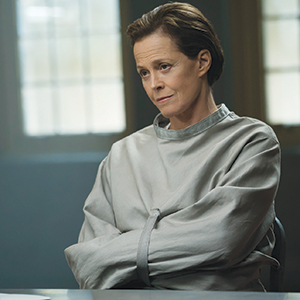Intro | Jane Lynch | The Valley | The Warriors | India In A Day | Festival Picks


Hit man Frankie Kitchen (Michelle Rodriguez) undergoes the ultimate femme-dom experience: he’s captured and involuntarily sex-changed by a vengeance-seeking mad doctor (Sigourney Weaver, excellent). Now a good-looking gunwoman with a pair of .45 automatics, she seeks payback against a gangster (Anthony LaPaglia) who set her up. The Assignment‘s director, the eminent Walter Hill of (48 Hours, and much more), shot it for what his producer termed a “responsible price”—”it became more responsible as the shoot went on.” The wet streets of Vancouver pose as the low-rent parts of San Francisco.
Hill knows how to make a thugs-vs.-trigger man film like few directors alive, as evidenced by his last movie, Bullet to the Head. But the controversial part of this fun winter’s tale should be obvious.
“The movie’s been attacked by quite a lot of people who haven’t seen it,” Hill says when reached by phone. “It’s a very lurid film. I was trying to do something like the episodes I did for TV’s Tales from the Crypt… I mean, a nasty little story. It has nothing to do with the transgendered. There are people who have a mental predisposition to change their sex. Frank Kitchen certainly does not have a predisposition—nor is he altered inside his head. He stays a guy with a guy’s attitude.”
Hill breaks this movie up into comic book frames—recalling the original framing concept he used in his seminal The Warriors (1979), and which Ang Lee used in The Hulk (2003). “When people say ‘comic book movie’ they usually mean something stupid,” Hills says. “But it’s an unusually liberating kind of genre—you can tell stories in shorthand and cut to the chase. It’s a genre in which not everybody has to be nice.”
The Assignment features the best performance any director has got from Michelle Rodriguez. “One of the first things Sigourney said after she saw it was to exclaim how good Michelle was. I believed in Michelle from the moment I saw her. You can’t do a movie that’s about a human body without confronting the material and being exhibitionistic. It took a lot of courage. She’s a brave girl, a brave actor. “
In Hill’s cult classic, The Warriors, a cohort of nine from a Coney Island gang must traverse New York—from the Bronx to their home turf in Brooklyn’s Coney Island—during an epically long night. The phantasmagorical thugs they encounter, including the horrifying Baseball Furies, put this opus right on the edge of science fiction. Yet The Warriors is based on a very early history of war, Xenophon’s Anabasis. The style of this wild and rousing film anticipates every superhero movie to be made in the following years. It’s the first movie really made in Gotham City. The Warriors‘ vistas of greasy iron and neon scribbles of graffiti were captured in New York City during some very unpacified times. The shoot wasn’t too troubled, however.
“We had resistance from real gangs, especially in Brooklyn,” Hill says. “They could never get an idea this was a movie. At times, they threw rocks. Up on the elevated subway tracks, they’d urinate down at the actors. The police were great with us—they did the best they could.”
Talk of remaking The Warriors has gone on for years. “I did my version,” Hill said, without resentment. “Nobody wants to make a period movie out of it. It was a slightly futuristic fantasy. The movie has hung on so well with the hip-hop crowd, they talk about tying it into the more modern music scene. At the time, it was a very big deal that one gang member had a gun. Jesus, nowadays they have submachine guns, it’s sad to say.”
Now in his mid-70s, Hill has a chance to consider his career. He doesn’t mind being called a “neo-noir” director. “I prefer action director. ‘Action director’ used to be demeaning. As opposed to a dramatic director, the action guys were on the back porch. But I liked the company you kept. I don’t work much anymore. I’m an old guy, but I like to keep my hand in. I did studio films, and tried to make a second or third movie that was kind of smaller…personal. Some of those never found an audience. I don’t rewatch them. Once I’m done with them, I’m done. As Truffaut said, films are never finished, they’re always abandoned.
Mar 11 at 7pm at the California Theatre


